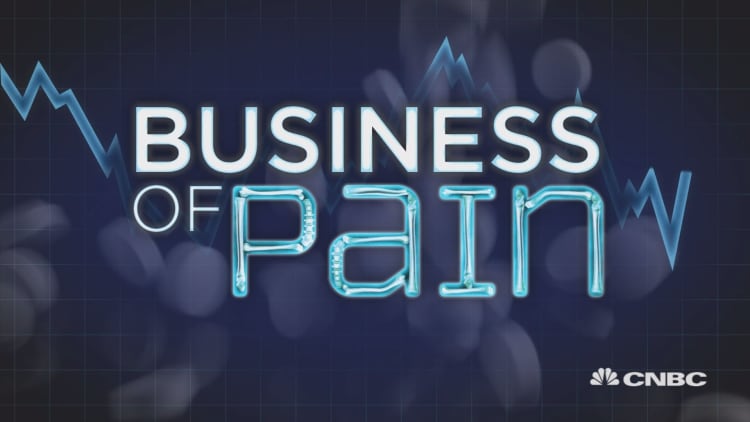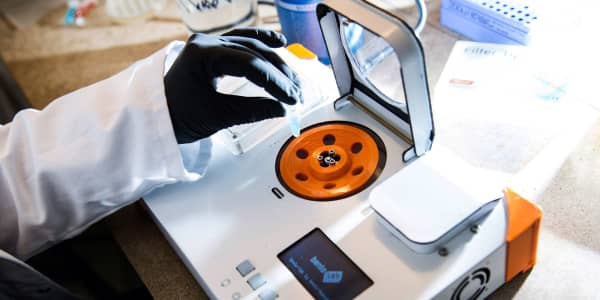
The headlines about Prince's reported painkiller addiction have captured the nation's attention, but the stats on America's opioid crisis show that it's in no way surprising.
Opioid addiction claimed 28,000 deaths in 2014, half from painkiller prescriptions, the highest number on record, according to the Centers for Disease Control and Prevention. Nearly half of all Americans know someone addicted to opioids. As much as 80 percent of American workplaces are confronting worker-addiction issues. America consumes a vast majority of the world's opioid supply.
The medical community is not helping to slow the nationwide epidemic as much as it could, according to news reports this week that the main physician professional group, the American Medical Association, has been resisting FDA efforts to set guidelines for doctor training on painkiller prescriptions.
Something has to give, and there is one novel new approach to the opioid crisis that some pain management physicians are backing: a testing battery that combines genetic risk with other personal factors to identify patients at high risk of addiction before a potentially fatal prescription is written.
Spine and pain physician Dr. Ashish Shanbhag of the National Spine & Pain Centers is using a new gene-based test he believes can help identify patients who could be predisposed to addiction.
The test Shanbhag uses is made by Proove Biosciences, and it includes an algorithm that scores a patient's risk of addiction. But it's not just about genes. Sixty percent of the score a patient receives is based on testing for genetic markets associated with addiction, of which there are several, including COMT, dopamine receptors and the opioid MU1 receptor gene.
The other 40 percent of the addiction-risk score comes from personal factors: age, personal medical history, previous substance abuse and any history of depression (due to its links to drug use).
"I have used the test on hundreds of patients," said Shanbhag. "What I'm really trying to do is tailor the therapy toward your specific genes to make sure we optimize the medications we get for you."
In patients at low risk, Dr. Shanbhag has confidence he can safely use opioids and then choose an opioid based on the Proove Opioid Response test — a separate test that analyzes how patients respond to and metabolize various drugs. In patients at moderate or high risk, the doctor looks for alternatives, like injections or other interventional procedures.
"Think of the reduced total burden on society from a social, economic and medical perspective as we do this," he said.
It's the 60 percent of the test that comes from gene analysis that has some genetics experts skeptical.
Jehannine Austin, president of the National Society of Genetic Counselors and associate professor of psychiatry and medical genetics at the University of British Columbia, said that while the Proove test is novel, it targets an important problem, and she knows of no other test like it. Yet she worries about the appeal of genetic testing's potential profits moving ahead of the science to support them.
"Opioid addiction, like most human behavioral traits, is a very complex issue that is hugely unlikely to be comprehensively explained by a small set of genetic variations," said Austin. "Most human behaviors and common conditions like addictions seem to result from the combined effects of genes and experiences working together. ... I worry that this is too simple of a strategy to address the real issue."
She added, "There is danger associated with people assuming that any problems that they have with addictions are entirely genetically determined. It can lead to fatalism or overestimation of risk for children experiencing similar problems."
Addiction-treatment experts join genetic counselors in skepticism about any approach based on genetics.
Richard Conaboy, vice president of clinical services at Clearbrook Treatment Centers, which provides care for many patients who are addicted to painkillers, said he remains highly skeptical that a genetic test can tell whether or not one is likely to become addicted to strong prescription painkillers.
Most human behaviors and common conditions like addictions seem to result from the combined effects of genes and experiences working together. ... I worry that this is too simple of a strategy to address the real issue.Jehannine Austinpresident of the National Society of Genetic Counselors
An increasing number of doctors are using the Proove battery of tests, nonetheless.
In 2015, 318 physicians ordered about 197,000 billable reports, including Proove Pain Perception, Proove Opioid Risk, Proove Opioid Response, Proove Drug Metabolism and others, according to the company. Of those billable reports, about 31,500 were for the Proove Opioid Risk score. Physicians or institutions using Proove testing include the University of Southern California Keck School of Medicine Pain Management Center, National Spine & Pain Center and Hoag Orthopedic Institute.
And Proove said criticism of reliance on genetics is somewhat misguided since the genetic test comprises only 60 percent of its addiction-risk score.
Brian Meshkin, CEO of Proove Biosciences, told CNBC that the company decided to develop the test because "the existing standard of care is resulting in an epidemic of avoidable pain and death."
Each Proove test is billed to insurance with an out-of-network cost around $1,000 and an in-network cost of $100, though insurance may require a patient to cover any co-pays, co-insurance or deductibles. Patients also have the option to become a participant in a Proove clinical study. The company said more than 90 percent of patients enroll in clinical studies.
The biggest issue of all may be the most obvious: Those strong opioids are also extremely effective in terms of relieving pain.
That's why Irina Koffler, senior analyst of specialty pharma at Mizuho Securities, said she doesn't see the opioid pain market going away anytime soon.
"Unfortunately, they [opioids] are the best option right now, and even though there are some newer drugs in development that promise to be opioid-like in their efficacy but without … some of the heavier side effects, I don't see anything going away due to alternative medicine, or not at least to my knowledge," Koffler said.
For now, much of the focus still seems to revolve around trying to be much more diligent in prescribing the opioids already on the market.
For example, Ascension, the largest nonprofit health-care system in the United States and the world's largest Catholic health system, is setting up its own guidelines on prescribing opioids that would apply to all of their 1,900 sites in the United States. This includes hospitals and clinics and will be implemented over the next six months.
"An important component to the guidelines includes the utilization of multimodal interventions, which combine medications such as non-steroidal, steroidal and opioids and increase the use of integrative therapies, such as aromatherapy, music, heat/cold and massage, to achieve safe and improved pain management," said Roy Guharoy, chief pharmacy officer for Ascension.







